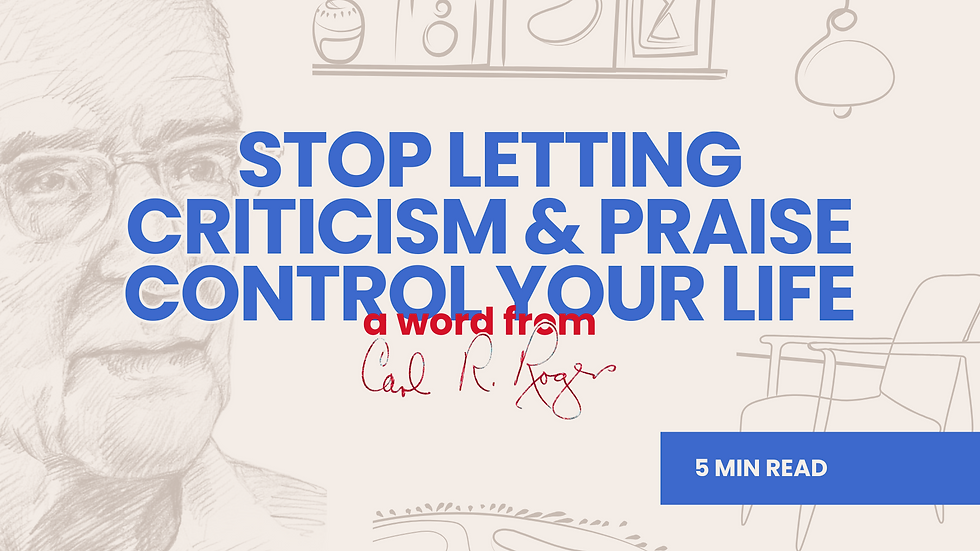Response Responsibilty, Stop People Pleasing
- Caleb Robertson
- Nov 23, 2024
- 3 min read
Have you ever replayed a conversation in your mind, wondering if you could have said something differently to avoid conflict or disappointment? Maybe you’ve bent over backward to ensure someone is happy with you, even at the cost of your own needs or values. It’s a common trap—thinking we can perform, strategize, or script enough to control someone else’s response.
The truth is this: other people’s responses are not your responsibility.
Other people’s responses are not your responsibility.
The Cost of People Pleasing
Trying to control how others feel about us often starts with good intentions. We want to be kind, avoid misunderstandings, or ensure harmony in our relationships. But when taken too far, this mindset can lead to self-sacrifice and resentment (toward the other or the self). Instead of living authentically, we find ourselves constantly adapting to meet others’ expectations.
When we prioritize someone else’s feelings over our authenticity, we’re silencing or betraying ourselves. And ironically, no matter how much effort we put into pleasing others, we cannot guarantee their response.
No matter how much effort we put into pleasing others, we cannot guarantee their response.
Why We Can't Control Others
Human behavior is complex, shaped by a mix of emotions, past experiences, values, worldviews, and mental frameworks. What someone feels in response to your words or actions often has more to do with them than it does with you.
What someone feels in response to your words or actions often has more to do with them than it does with you.
You might try to phrase something just right to avoid hurting their feelings, but their reaction might still come from their own insecurities or assumptions. Similarly, you might give your all to make someone happy, but their response could reflect factors beyond your control—stress, fatigue, or unresolved issues that have nothing to do with you.

Realizing this can be both freeing and uncomfortable. It means releasing the illusion of control and accepting that other people’s happiness is not your job.
What You Can Control
While you can’t control someone else’s response, you can control your actions and intentions. Focus on showing up with integrity:
Speak honestly and kindly.
Stay true to your values.
Set boundaries when needed.
Respect others’ autonomy while maintaining your own.
By doing this, you honor yourself and your relationships without sacrificing your joy or self-respect.
The Freedom of Letting Go
When you stop taking responsibility for how others respond, you free yourself from unnecessary stress and guilt. You can engage in relationships more authentically, knowing that you’re showing up as your true self.
It’s not easy to let go of the desire to control outcomes, especially if you’re used to "fixing" and "people pleasing." But as you practice, you’ll notice a weight lifting. Relationships become more fulfilling when they’re built on mutual respect, not constant self-sacrifice.
So the next time you find yourself overthinking how to make someone happy or avoid conflict, take a step back. Remember that their feelings are their own—and you are only responsible for living in authentic alignment with your values.
You don’t need to perform or script your way into someone’s approval. You just need to be you.
You don’t need to perform or script your way into someone’s approval. You just need to be you.
Disclaimer:
These thoughts are presented with curiosity, wonder, and a sense of discovery.
There is so much scholarly material around religion, history, sociology, and psychology (realms I spend much of my time in). While that is immensely valuable and should be consulted when lives are at stake, I'd never produce anything if I required myself to scour these depths before voicing my thoughts which I believe to contain value and worth.
As such, it would not surprise me if my conclusions change in the future. And I hope it doesn't surprise you. That change of mind could come tomorrow, or it could come years from now. Curiosity isn't concrete. Trying to make it so robs it of its strength and beauty. As you read, I hope you will remember this - on my behalf and on yours.
Additionally, this post is not a substitute for psychotherapy or professional advice. If you are experiencing emotional distress or seeking personalized guidance, please consult a licensed mental health professional or other qualified expert.



Comentarios